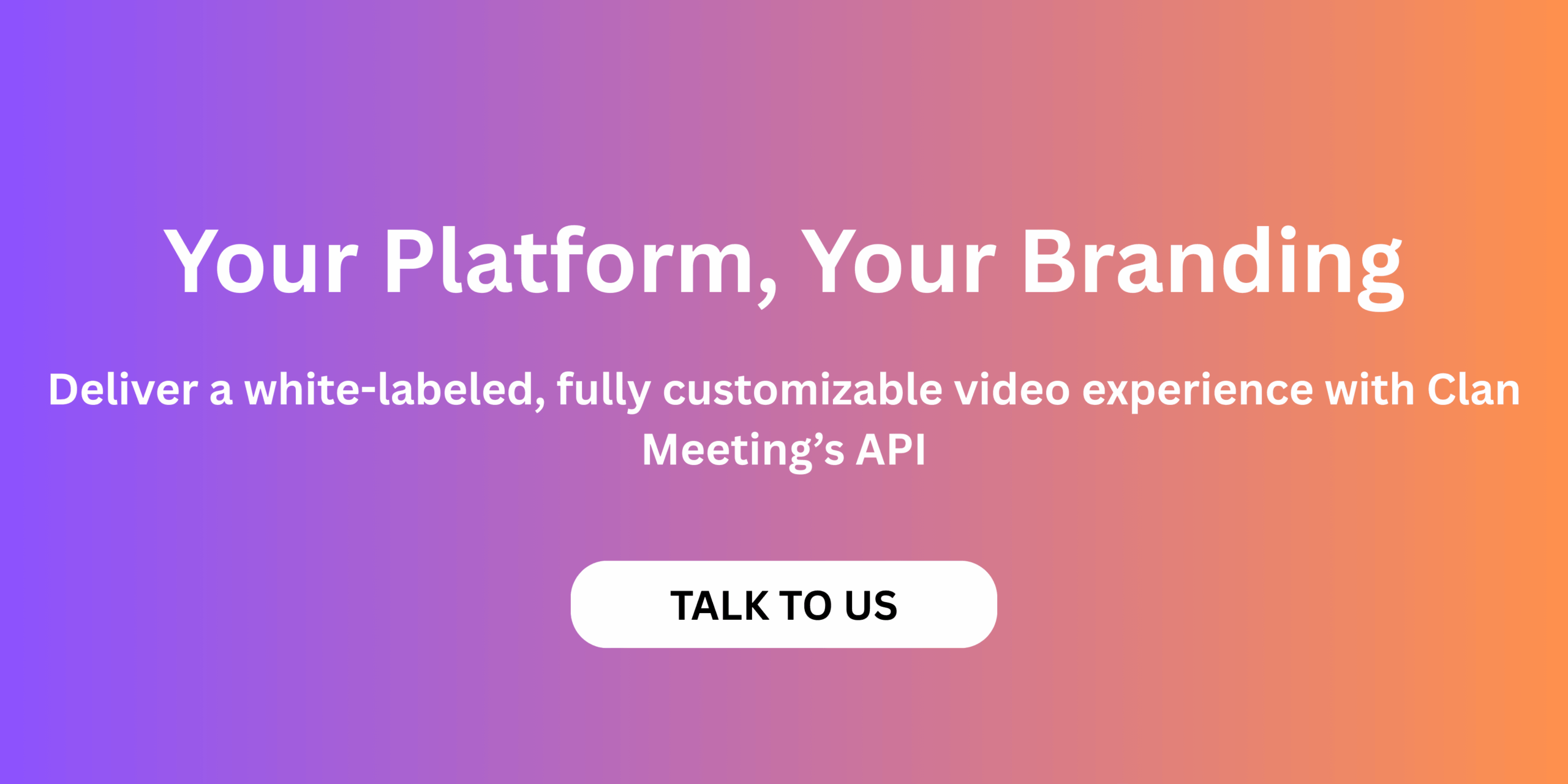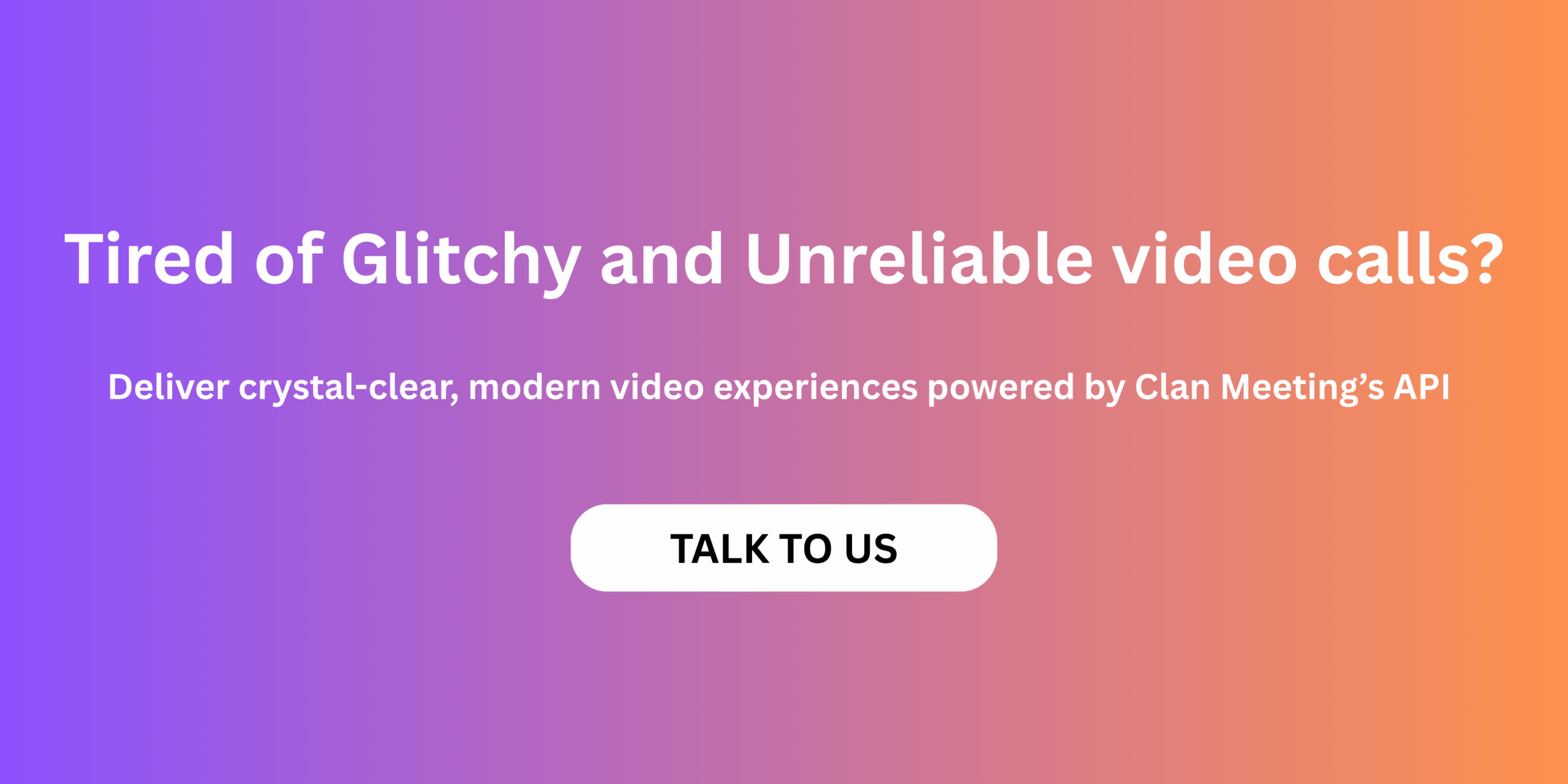Video is now the front door to hiring.
Every first-round interview, onboarding session, and internal catch-up happens face-to-face but usually through a screen. For HR software platforms, that has turned video from a “nice-to-have” integration into something central to user experience.
Embedded video conferencing API allows these moments to happen inside the product itself - branded, secure, and without sending users off to another tab.
The question however is which API gives HR teams the right balance of performance, pricing, and developer control. With multiple providers like Twilio, Agora, Daily, and Clan Meeting choosing the right API depends on more than just video quality - pricing, developer effort, scalability, and HR-specific features all matter.
This comparison examines how each platform stacks up across performance, cost, and usability for HR technology products.
Why HR Platforms Need Integrated Video
Recruiters spend most of their day switching tools - calendar, ATS, video, feedback forms. When the meeting experience lives inside the HR platform, that context switching again and again disappears.
The benefits are obvious -
- Continuity - Interviews and recordings stay attached to the candidate record
- Brand consistency - Every interaction looks like part of your own product
- Data control - Video, chat, and transcripts stay within your compliance perimeter
For platforms managing thousands of interviews a month, those details are worth every penny and time.
Overview of the Platforms
Before diving into comparisons, it helps to understand what each platform actually brings to the table.
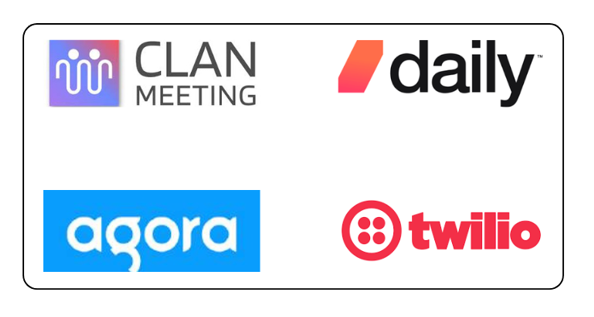
While all four offer live video capabilities, they differ in philosophy - some prioritize scale and flexibility, others focus on simplicity or vertical specialization.
Clan Meeting – A video conferencing API built specifically for HRTech. Lightweight integration (around ten lines of code), usage-based pricing, and built-in features for interviews, onboarding, and training.
Twilio Programmable Video – A well-established API from a communications giant. Stable and globally supported, but intentionally generic.
Agora.io – Runs on a global low-latency network (SD-RTN). Highly modular - developers can add chat, streaming, or whiteboards as needed.
Daily.co – A WebRTC-based API focused on simplicity and transparency. Quick to integrate, developer-friendly, and strong on performance.
Each can power interviews, onboarding, and internal collaboration. However, differences start to appear when you look at depth of features, customization effort, and the overall developer experience.
Feature Comparison
Feature | Clan Meeting | Twilio | Agora | Daily |
Screen Sharing | Yes | Yes | Yes | Yes |
Recording | Yes (with transcription) | Yes | Yes | Yes |
In-call Chat | Built-in | Via Data Tracks | Separate Add-on | Built-in |
Breakout Rooms | Native | Custom Code | Not native | Native |
Whiteboard / Collaboration | Built-in | Custom | Separate Add-on | Not native |
Mobile SDKs | iOS / Android | iOS / Android | iOS / Android | iOS / Android |
Compliance | GDPR | HIPAA / GDPR | GDPR / HIPAA | HIPAA / SOC2 |
In practice, this means an HR product manager using Clan Meeting or Daily can enable group interviews, Q&A, and file sharing with minimal extra code. Twilio and Agora let you build the same thing, but you start from a blank canvas.
That flexibility suits some teams, though many HR SaaS startups prefer something ready-to-run - especially when speed to market outweighs everything else.
Latency and Real World Performance
Video lag can quietly ruin an interview. A candidate pauses, the hiring panel talks over each other, and the entire flow feels off.
Agora is known for its global performance, with a Software-Defined Real-Time Network (SD-RTN) claiming latency around 400 ms or less worldwide .
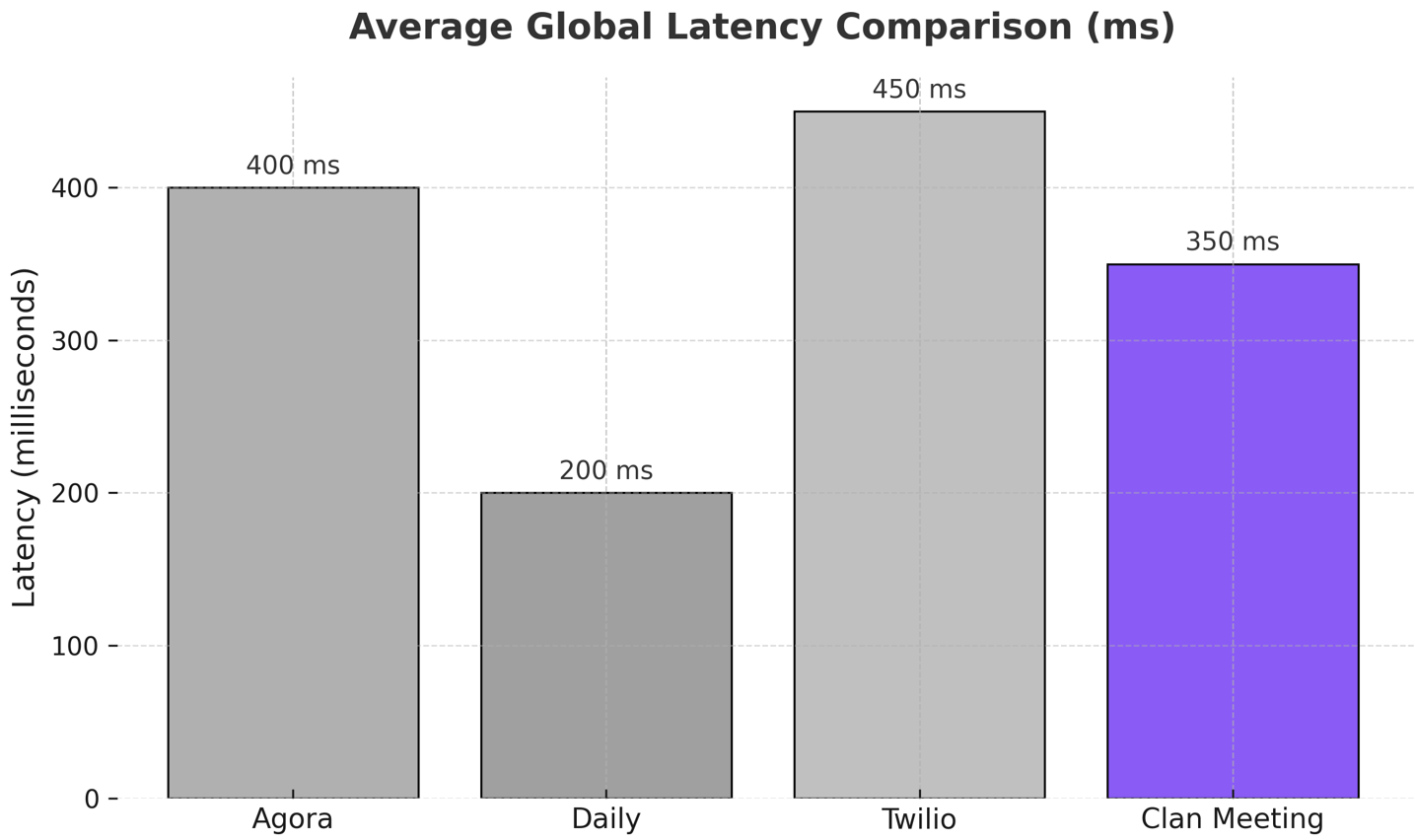
Video Conferencing API Latency Comparison
Daily reports even lower numbers - about 200 ms median latency - thanks to more than 70 global points of presence. Twilio does not publish formal latency data but offers APIs to monitor and adapt bandwidth in real time .
Clan Meeting takes a different tack.
Rather than chasing ultra-low milliseconds, it optimizes for stability in poor network environments, dynamically adjusting video quality and bypassing strict corporate firewalls . That focus makes it practical for platforms interviewing in regions where connectivity is less predictable.
Pricing and Cost Structure
Pricing is often where decisions are made.
Clan Meeting is about half the cost of Twilio or Daily on paper . It also includes free transcription with every recording - something that would normally require a separate speech-to-text API.
Provider | Base Video Rate | Free Minutes | Recording | Storage |
$0.002 / participant-min | Promotional credits | $0.008 / min (includes transcript) | $0.04 / GB | |
$0.004 / participant-min | None | $0.004 / min | $0.05 / GB | |
$3.99 / 1,000 mins (≈$0.00399) | 10,000 / mo | $0.00099 / min | User-managed | |
$0.004 / participant-min | 10,000 / mo | $0.01349 / min | $0.003 / min |
Agora and Daily both offer monthly free-minute allowances, useful for pilot projects while Twilio keeps things simple but has no free tier.
Clan Meeting’s “dynamic participant-minute” billing is also worth noting: it counts only the time each person actually spends in a session . In group interviews where panellists join or leave midway, that nuance can save 10–20 % in usage.
Developer Experience
Engineering teams usually fall into two camps - those wanting total control and those wanting something that just works.
Clan Meeting and Daily fall in the latter category. Both ship with prebuilt interfaces, letting teams launch branded video rooms in hours instead of weeks.
Twilio is the opposite end of the spectrum - powerful and stable but requiring more assembly. You get APIs for every component but must design the full UX yourself.
Agora offers breadth but expects familiarity with its ecosystem. Developers often juggle separate SDKs for video, chat, and recording. It scales beautifully once configured but has a steeper learning curve.
For HRTech teams racing to release features, Clan Meeting’s simplicity - embed, theme, go tends to shorten implementation cycles.
HRTech Use Cases
Candidate Interviews
Panel interviews typically need chat, screen sharing, and sometimes breakout discussions.
While Clan Meeting and Daily handle all three natively, Twilio and Agora do that with custom logic, though setup takes longer. Clan Meeting also auto-transcribes sessions and stores them with the candidate record, a small touch that saves recruiters hours later.
Technical Assessments
When candidates write or review code live, even slight lag matters.
Agora’s and Daily’s low-latency networks shine here while Clan Meeting’s adaptive bitrate keeps sessions usable even if one side’s connection dips. Its integrated whiteboard can double as a shared problem-solving space.
Onboarding and Training
Onboarding sessions often mix presentations with interactive Q&A.
Clan Meeting includes built-in polls and breakout rooms for that reason. Daily performs well for similar group setups. Twilio’s participant cap (around 50 per room) and Agora’s modular add-ons make them better suited to structured, pre-planned sessions rather than spontaneous workshops.
Security and Compliance
Every provider encrypts media streams, but HR data raises the bar -
- Twilio and Daily offer HIPAA-ready options for regulated industries
- Agora is fully GDPR compliant and guarantees 99.99 % uptime
- Clan Meeting supports GDPR and allows self-hosting for organizations that want recordings to remain on-premise
For HR platforms handling candidate information or internal employee data, these differences influence enterprise trust just as much as performance numbers.
Clan Meeting’s HR-Centric Positioning
What stands out about Clan Meeting is its focus. It does not try to be a generic video layer for every industry. It focuses on HR workflows and the realities of hiring.
- Interview ready tools - waiting rooms, whiteboards, breakout rooms, transcripts - all built in one platform.
- Resilient streaming - adaptive quality for low-bandwidth environments.
- Predictable cost - usage-based pricing with automatic discounts.
- Quick deployment - embed in minutes, theme easily, scale without rework.
This clarity of purpose makes it a practical fit for ATSs, assessment platforms, and onboarding products that value speed and cost efficiency over total customization.
Conclusion
The first impression a candidate gets of a company often happens through video. If that experience feels smooth, personal, and reliable, it reflects well on both the employer and the platform enabling it.
Twilio, Agora, and Daily have earned their reputations for scale and performance. Clan Meeting approaches the same challenge through a different lens — affordability, simplicity, and HR-specific design.
For HR SaaS teams deciding where to build, the right video conferencing API is not just about bandwidth or price per minute. It is about how easily it fits into the workflows that shape every hiring and onboarding journey.
Frequently Asked Questions
1. What is a video conferencing API?
A video conferencing API lets developers embed live video, audio, and chat directly into their applications. Instead of redirecting users to Zoom or Google Meet, platforms can host real-time communication inside their own interface using APIs and SDKs.
2. How are video conferencing APIs used in HRTech platforms?
HRTech products use these APIs for interviews, candidate screening, onboarding, and training. They allow recruiters and candidates to connect within the same platform, with features like recording, scheduling, and chat integrated into existing workflows.
3. Why do many HR SaaS companies choose Clan Meeting over Twilio, Agora, or Daily?
Clan Meeting was built for HR-focused use cases. It includes panel interviews, transcripts, breakout rooms, and polls out of the box, while most competitors require additional setup or integrations. It also offers usage-based pricing that keeps costs predictable during fluctuating hiring cycles.
4. What kind of latency can HR platforms expect from these APIs?
Typical average global latencies are: Agora around 400 ms, Daily near 200 ms, Twilio about 450 ms, and Clan Meeting roughly 350 ms with adaptive optimization. For live interviews or coding assessments, lower latency directly improves conversation flow and feedback accuracy.
5. How do these APIs charge for usage?
Most providers follow a pay-as-you-go model based on participant minutes. Clan Meeting starts at $0.002 per minute, while Twilio and Daily are around $0.004. Agora offers free monthly minutes and then tiered rates. Additional charges may apply for recording and storage.
6. Can these APIs scale for enterprise-level hiring or onboarding sessions?
Yes. Clan Meeting supports up to 200 concurrent participants with breakout controls, Daily can handle up to 1,000 in real time, and Agora’s modular setup can scale to thousands through streaming extensions. Twilio is more conservative, capping group rooms at about 50 participants.
